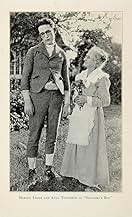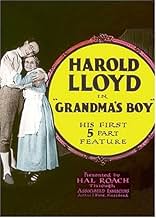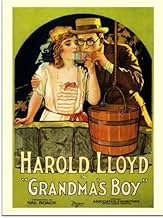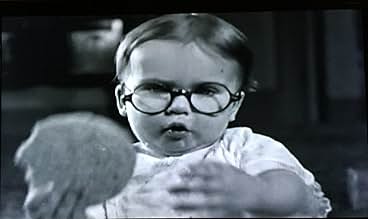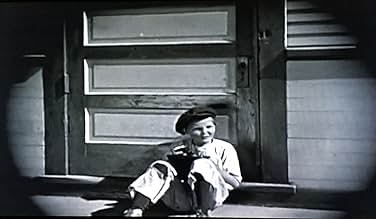IMDb-BEWERTUNG
7,0/10
2165
IHRE BEWERTUNG
Füge eine Handlung in deiner Sprache hinzuA meek young man must find the courage within when a rogue tramp menaces his home town.A meek young man must find the courage within when a rogue tramp menaces his home town.A meek young man must find the courage within when a rogue tramp menaces his home town.
- Auszeichnungen
- 1 wins total
Jack Morgan
- Little Boy with Grandma
- (Gelöschte Szenen)
Roy Brooks
- Townsman
- (Nicht genannt)
Sammy Brooks
- Townsman
- (Nicht genannt)
Jack Edwards
- Grandma's Boy as a Baby
- (Nicht genannt)
William Gillespie
- Townsman
- (Nicht genannt)
- …
John Hatton
- Schoolboy Bully #1
- (Nicht genannt)
Wally Howe
- The Girl's Father
- (Nicht genannt)
- …
Mark Jones
- Old Hag with Talisman
- (Nicht genannt)
James T. Kelley
- Townsman
- (Nicht genannt)
Gus Leonard
- Farmer
- (Nicht genannt)
Gaylord Lloyd
- Townsman
- (Nicht genannt)
George Rowe
- Townsman
- (Nicht genannt)
Empfohlene Bewertungen
About 20 years ago I was fortunate enough to see Harold Lloyd's first feature-length film, Grandma's Boy, at a public screening. I recall that it went over very well with the audience, that Harold was highly sympathetic in the lead role, and that I found the movie pleasant and engaging, with a stronger plot than some of Lloyd's later features. Now that I've rediscovered the film on DVD it's a pleasure to report that it holds up beautifully and, unlike some silent comedies, plays well on TV. Grandma's Boy is a richly atmospheric period piece that is sweet, funny, and suspenseful, and certainly ranks with Lloyd's best work. It's all the more impressive that this was his first attempt at a full-length feature, for it marks a genuine stylistic break with the sort of thing he'd been making up to this point. Unlike some of Harold's earlier, "gag happy" short comedies, this film offers a well structured story built around recognizable human beings who inhabit a basically realistic world. The story is more character-driven than gag-driven, and more relaxed in tempo than most of Lloyd's earlier films. Admittedly, some of the characters are a little cartoon-y, but they don't behave outlandishly or pick fights at the drop of a hat in order to get laughs. And while there are certainly plenty of laughs along the way, everything seems to unfold naturally, and nothing feels forced.
Grandma's Boy is set in the sleepy rural village of Blossom Bend, which, we are told, is "one of those slow towns where the Tuesday morning Express arrives Wednesday afternoon. If Monday's train gets out of the way." Except for a brief prologue and a flashback to the Civil War, the story takes place when the film was made, that is, in 1922, but in the sort of Town That Time Forgot that might have looked like a quaint throwback to some viewers even then. Harold plays a young man who lives with his grandmother, and is the kind of guy who would be called a wimp -- or worse -- nowadays. The prologue dramatizes Harold's lifelong reluctance to defend himself from bullies. He's a coward, he knows it, and he's miserable about it. On the other hand, Harold's grandmother is a peppery old lady who is not to be trifled with. (Anna Townsend plays this role, and she's wonderful). Grandma sympathizes with the boy's plight, yet also realizes she's coddled him long enough, and that he must find the courage within himself, even if getting him to that point requires trickery on her part.
This movie paints a nostalgic picture of small town life that was never so simple in reality, but, like the story of Tom Sawyer, it holds the powerful appeal of life as we wish it was. Period charm is a major element of the film's strength, but in order to appreciate it fully a modern viewer needs a certain amount of historical perspective. For example: during one scene, when Harold is forced to wear his grandfather's ancient suit to a party, his embarrassment may be hard for some to understand. The other party-goers think he looks strange in his 19th century frock coat, but their own clothing looks just as odd to us as Harold's "old-fashioned" suit does to them, especially the leading lady's massive hair ribbon. (Did that thing look funny to some viewers, even in 1922? I'll bet the flappers thought so!)
The film's best known sequence is a flashback to the Civil War, as Harold's Grandma tells him of his grandfather's exploits behind enemy lines. This is the funniest segment, deliberately played in a "heightened" manner like a hokey stage melodrama. I was especially fascinated by the witch who helps Harold's grandfather triumph over his enemies; she wears heavy stage makeup, emotes like crazy, and looks like she must have a gingerbread house somewhere back in the woods. All of this wacky over-playing is acceptable, dramatically speaking, because we eventually learn that Grandma's story is, well, not entirely true. It's interesting that Lloyd and his colleagues took this approach to the Civil War sequence, but the motivation is not hard to imagine: when this film was made there were plenty of actual Civil War veterans still around, and the war and its aftermath lingered as a painful memory for many. Perhaps the filmmakers chose to treat the war scenes as exaggerated melodrama in order to make the material more palatable to contemporary audiences. A few years later, when Buster Keaton made The General, he chose to treat the war with almost documentary-like realism while dropping black comedy gags into the mix, and some critics of the day felt his approach was in poor taste. Lloyd's version of the war is quite different from Keaton's but valid in its own way, and may well have influenced Keaton when he made his masterpiece.
As memorable as the Civil War sequence is, the most gripping section of the film depicts Harold's transformation from coward to hero, as he manages to subdue a dangerous tramp who has been terrorizing the town. (The tramp is played by Dick Sutherland, an enormous actor with an unforgettable face.) This is a terrifically suspenseful sequence, alternately funny and thrilling, and it's followed by a deeply satisfying finale in which this lifelong sissy applies the lessons he learned in dealing with the tramp to the bully who has tormented him since boyhood. And don't miss the delightful closing gag! Grandma's Boy is a film that leaves the viewer with a warm glow, one of the best movies Harold Lloyd ever made, and one of the top comedies of the silent era.
Grandma's Boy is set in the sleepy rural village of Blossom Bend, which, we are told, is "one of those slow towns where the Tuesday morning Express arrives Wednesday afternoon. If Monday's train gets out of the way." Except for a brief prologue and a flashback to the Civil War, the story takes place when the film was made, that is, in 1922, but in the sort of Town That Time Forgot that might have looked like a quaint throwback to some viewers even then. Harold plays a young man who lives with his grandmother, and is the kind of guy who would be called a wimp -- or worse -- nowadays. The prologue dramatizes Harold's lifelong reluctance to defend himself from bullies. He's a coward, he knows it, and he's miserable about it. On the other hand, Harold's grandmother is a peppery old lady who is not to be trifled with. (Anna Townsend plays this role, and she's wonderful). Grandma sympathizes with the boy's plight, yet also realizes she's coddled him long enough, and that he must find the courage within himself, even if getting him to that point requires trickery on her part.
This movie paints a nostalgic picture of small town life that was never so simple in reality, but, like the story of Tom Sawyer, it holds the powerful appeal of life as we wish it was. Period charm is a major element of the film's strength, but in order to appreciate it fully a modern viewer needs a certain amount of historical perspective. For example: during one scene, when Harold is forced to wear his grandfather's ancient suit to a party, his embarrassment may be hard for some to understand. The other party-goers think he looks strange in his 19th century frock coat, but their own clothing looks just as odd to us as Harold's "old-fashioned" suit does to them, especially the leading lady's massive hair ribbon. (Did that thing look funny to some viewers, even in 1922? I'll bet the flappers thought so!)
The film's best known sequence is a flashback to the Civil War, as Harold's Grandma tells him of his grandfather's exploits behind enemy lines. This is the funniest segment, deliberately played in a "heightened" manner like a hokey stage melodrama. I was especially fascinated by the witch who helps Harold's grandfather triumph over his enemies; she wears heavy stage makeup, emotes like crazy, and looks like she must have a gingerbread house somewhere back in the woods. All of this wacky over-playing is acceptable, dramatically speaking, because we eventually learn that Grandma's story is, well, not entirely true. It's interesting that Lloyd and his colleagues took this approach to the Civil War sequence, but the motivation is not hard to imagine: when this film was made there were plenty of actual Civil War veterans still around, and the war and its aftermath lingered as a painful memory for many. Perhaps the filmmakers chose to treat the war scenes as exaggerated melodrama in order to make the material more palatable to contemporary audiences. A few years later, when Buster Keaton made The General, he chose to treat the war with almost documentary-like realism while dropping black comedy gags into the mix, and some critics of the day felt his approach was in poor taste. Lloyd's version of the war is quite different from Keaton's but valid in its own way, and may well have influenced Keaton when he made his masterpiece.
As memorable as the Civil War sequence is, the most gripping section of the film depicts Harold's transformation from coward to hero, as he manages to subdue a dangerous tramp who has been terrorizing the town. (The tramp is played by Dick Sutherland, an enormous actor with an unforgettable face.) This is a terrifically suspenseful sequence, alternately funny and thrilling, and it's followed by a deeply satisfying finale in which this lifelong sissy applies the lessons he learned in dealing with the tramp to the bully who has tormented him since boyhood. And don't miss the delightful closing gag! Grandma's Boy is a film that leaves the viewer with a warm glow, one of the best movies Harold Lloyd ever made, and one of the top comedies of the silent era.
Blossom Bend is a small leisurely place. Harold (Harold Lloyd) is a meek, modest, and retiring 19 year old. He's in love with Mildred although he faces his Rival at every turn. He's raised by his loving grandma. No matter how much he's bullied since childhood, he never fights back. The latest is a dirty volatile tramp. The sheriff leading a mob arrives looking to apprehend the tramp for robbery and murder. Harold volunteers for the posse although he doesn't have the courage to do the job until his grandma gives him his grandpa's magic charm which he got during the war.
This is a fun little feature from Lloyd. Personally, I thought it was brave not to hit back as a little kid and it was kindness to give the other kid his food. Obviously, I don't want him to hide under his cover in fear. There are some great car chase stunts. It's plenty funny and I like the character. It's a solid silent era comedy.
This is a fun little feature from Lloyd. Personally, I thought it was brave not to hit back as a little kid and it was kindness to give the other kid his food. Obviously, I don't want him to hide under his cover in fear. There are some great car chase stunts. It's plenty funny and I like the character. It's a solid silent era comedy.
Although the similarity of this plot to several other Lloyd films is obvious (thus preventing it from getting a rating of 10), this is still one of Harold Lloyd's best. What sets this apart from many comedies of the same era is that it is NOT jam-packed with laughs but takes a more leisurely pace and tells a sweet story. Our hero, Lloyd, is a wimp with little self-confidence. His loving grandmother gives him Grandpa's good luck charm--saying it will give him strength and courage. As a result he is able to help the town look for a dangerous desperado and in the process prove to his girl that he is indeed a man.
Great cinematography, pacing and excellent laughs all work together to make this his best film up until that time. Plus, unlike most comedies of the time, this one is quite artistic and sweet.
Great cinematography, pacing and excellent laughs all work together to make this his best film up until that time. Plus, unlike most comedies of the time, this one is quite artistic and sweet.
Harold Lloyd's first great feature pits him in his ideal homespun setting with a simple and archetypal plot in which the mild-mannered Boy gradually learns to overcome his cowardice - with the help of his loving grandmother - to become the toast of the town; in this respect, it predates the star's more celebrated THE FRESHMAN (1925) in being, above all, character-driven (with a dash of sentimentality). That said, perhaps the film's most hilarious scene is a typical one in which both Lloyd and his rival for the affections of leading lady Mildred Davis unwittingly mistake moth-balls from Lloyd's ancient costume (which had belonged to his grandfather) for sweets.
It's climaxed, however, by three lengthy and impressive set-pieces: the Civil War feat of the hero's grandfather (also played by Lloyd and remarkably anticipating Keaton's THE GENERAL [1927]); the chase leading up to the capture of the town bully by the newly-brave Lloyd (brought about by the presence of a Zuni doll - more than 50 years before such an artifact would achieve immortality via the classic made-for-TV compendium TRILOGY OF TERROR [1975]!); and our hero's settling of accounts with his mean-spirited rival, which features some rather physical tussling for this kind of film. As ever with Lloyd, apart from providing the requisite attention to gag structure and the creation of atmosphere, the film results in being quite technically proficient.
It's climaxed, however, by three lengthy and impressive set-pieces: the Civil War feat of the hero's grandfather (also played by Lloyd and remarkably anticipating Keaton's THE GENERAL [1927]); the chase leading up to the capture of the town bully by the newly-brave Lloyd (brought about by the presence of a Zuni doll - more than 50 years before such an artifact would achieve immortality via the classic made-for-TV compendium TRILOGY OF TERROR [1975]!); and our hero's settling of accounts with his mean-spirited rival, which features some rather physical tussling for this kind of film. As ever with Lloyd, apart from providing the requisite attention to gag structure and the creation of atmosphere, the film results in being quite technically proficient.
"Grandma's Boy" is an entertaining Harold Lloyd comedy that combines plenty of his usual slapstick antics with some thoughtful, if simple, ideas that add another dimension. Lloyd's character is more sympathetic than usual, and the story is funny, includes some good action, and is occasionally reflective. While it does not have any dazzling sequences (such as in "Safety Last"), it succeeds quite well on its own level.
Lloyd gives a good performance as always, with his hapless but earnest character. The rest of the cast helps out as well. Charles Stevenson is suitably overbearing as Lloyd's rival, Mildred Davis is likable as his girlfriend, and Anna Townsend is believable as his grandmother, determined to help out her boy. The amusing story that she tells about Harold's grandfather is one of the highlights, and it is used quite well in the plot.
The rest of the story is good as well, and all in all this is an enjoyable little feature.
Lloyd gives a good performance as always, with his hapless but earnest character. The rest of the cast helps out as well. Charles Stevenson is suitably overbearing as Lloyd's rival, Mildred Davis is likable as his girlfriend, and Anna Townsend is believable as his grandmother, determined to help out her boy. The amusing story that she tells about Harold's grandfather is one of the highlights, and it is used quite well in the plot.
The rest of the story is good as well, and all in all this is an enjoyable little feature.
Wusstest du schon
- WissenswertesOriginally intended as a serious movie, this film was altered by Harold Lloyd into a comedy by adding the gag scenes later on.
- PatzerGrandma's boy puts six mothballs in the chocolate box. His girl gives him one from the box, but when his rival later picks up two, there are seven mothballs in the box instead of five.
- Zitate
Title Card: .The place. BLOSSOM BEND: One of those slow towns where the Tuesday morning Express arrives Wednesday afternoon. If Monday's train gets out of the way.
- VerbindungenFeatured in American Masters: Harold Lloyd: The Third Genius (1989)
- SoundtracksYou Are the Ideal of My Dreams
(1910) (uncredited)
Music and Lyrics by Herbert Ingraham
Sheet music shown before The Girl plays it on piano
Top-Auswahl
Melde dich zum Bewerten an und greife auf die Watchlist für personalisierte Empfehlungen zu.
- How long is Grandma's Boy?Powered by Alexa
Details
Box Office
- Budget
- 94.412 $ (geschätzt)
- Laufzeit
- 1 Std.(60 min)
- Farbe
- Sound-Mix
- Seitenverhältnis
- 1.33 : 1
Zu dieser Seite beitragen
Bearbeitung vorschlagen oder fehlenden Inhalt hinzufügen

